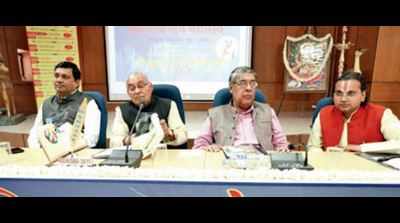- News
- City News
- jaipur News
- ‘Sanskrit manuscripts should be declared national asset’
Trending
This story is from February 9, 2017
‘Sanskrit manuscripts should be declared national asset’

Academicians during the Sanskrit Youth Festival on Wednesday.
JAIPUR: Sanskrit manuscripts should be made a national asset to conserve and interpret the ancient knowledge, demanded academicians during the Sanskrit Youth Festival organized by the Rajasthan Sanskrit Academy at Forest Training Institute in Jaipur on Wednesday. The academicians argued that several lakhs of manuscripts are in the private possession of families which are decaying with every passing minute.
Shastri Kosalandradas, associate professor of Sanskrit University, informed that Rajasthan has rich legacy of Sanskrit texts which are yet to excavated, translated and interpret at historical sites.“The once flourishing Buddhist monasteries or complexes at four places—Bhairat in Alwar, Kholvi in Jhalawar, Bandarez in Dausa and Ramgoan in Tonk treasures of knowledge. These complexes have inscriptions in Magadhi Prakrit shares a genealogy with Sanskrit,” said Kosalandardas.
The national mission for manuscripts in New Delhi has estimated to have 2-3 crore manuscripts and barely 45 lakh have reached them for digitization. “Many elite families in the state possessed these manuscripts and they have kept it as religious texts without understanding its importance in the diverse fields--politics, administration, medical, philosophy, agriculture etc. They are unknowingly committing a tragedy by keeping with themselves,” said Kosalanedas. The academicians viewed that either they donate it to NMM for the larger interest of the society.
The programme was attended by Sanskrit students from Sanskrit University and Sanskrit Colleges in the city. During the programme, students raised apprehensions over the no growth in the job opportunities for Sanskrit scholars.
“These texts have the potential to come with more effective means of government, law, administration, harmony between nature and human. All is required is dedicate time for research,” said Dave.
Shastri Kosalandradas, associate professor of Sanskrit University, informed that Rajasthan has rich legacy of Sanskrit texts which are yet to excavated, translated and interpret at historical sites.“The once flourishing Buddhist monasteries or complexes at four places—Bhairat in Alwar, Kholvi in Jhalawar, Bandarez in Dausa and Ramgoan in Tonk treasures of knowledge. These complexes have inscriptions in Magadhi Prakrit shares a genealogy with Sanskrit,” said Kosalandardas.
The national mission for manuscripts in New Delhi has estimated to have 2-3 crore manuscripts and barely 45 lakh have reached them for digitization. “Many elite families in the state possessed these manuscripts and they have kept it as religious texts without understanding its importance in the diverse fields--politics, administration, medical, philosophy, agriculture etc. They are unknowingly committing a tragedy by keeping with themselves,” said Kosalanedas. The academicians viewed that either they donate it to NMM for the larger interest of the society.
The programme was attended by Sanskrit students from Sanskrit University and Sanskrit Colleges in the city. During the programme, students raised apprehensions over the no growth in the job opportunities for Sanskrit scholars.
Jyoti Dave, director of Rajasthan Sanskrit Academy, quoted the noted Sanskrit scholar and author from the West, Audrey Trushke, an post-doctoral fellowship in Religious Studies at Stanford University, who in her Book 'Culture of Encounters' stated that how Mughals derived their administrative and political policies from the translation of the ancient Sanskrit text.
“These texts have the potential to come with more effective means of government, law, administration, harmony between nature and human. All is required is dedicate time for research,” said Dave.
End of Article
FOLLOW US ON SOCIAL MEDIA










